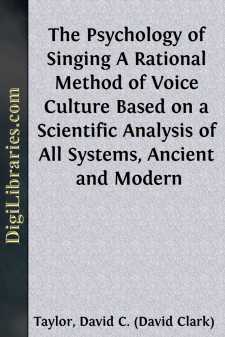Categories
- Antiques & Collectibles 13
- Architecture 36
- Art 48
- Bibles 22
- Biography & Autobiography 813
- Body, Mind & Spirit 142
- Business & Economics 28
- Children's Books 17
- Children's Fiction 14
- Computers 4
- Cooking 94
- Crafts & Hobbies 4
- Drama 346
- Education 46
- Family & Relationships 57
- Fiction 11829
- Games 19
- Gardening 17
- Health & Fitness 34
- History 1377
- House & Home 1
- Humor 147
- Juvenile Fiction 1873
- Juvenile Nonfiction 202
- Language Arts & Disciplines 88
- Law 16
- Literary Collections 686
- Literary Criticism 179
- Mathematics 13
- Medical 41
- Music 40
- Nature 179
- Non-Classifiable 1768
- Performing Arts 7
- Periodicals 1453
- Philosophy 64
- Photography 2
- Poetry 896
- Political Science 203
- Psychology 42
- Reference 154
- Religion 513
- Science 126
- Self-Help 84
- Social Science 81
- Sports & Recreation 34
- Study Aids 3
- Technology & Engineering 59
- Transportation 23
- Travel 463
- True Crime 29
The Psychology of Singing A Rational Method of Voice Culture Based on a Scientific Analysis of All Systems, Ancient and Modern
Categories:
Description:
Excerpt
A peculiar gap exists between the accepted theoretical basis of instruction in singing and the actual methods of vocal teachers. Judging by the number of scientific treatises on the voice, the academic observer would be led to believe that a coherent Science of Voice Culture has been evolved. Modern methods of instruction in singing are presumed to embody a system of exact and infallible rules for the management of the voice. Teachers of singing in all the musical centers of Europe and America claim to follow a definite plan in the training of voices, based on established scientific principles. But a practical acquaintance with the modern art of Voice Culture reveals the fact that the laws of tone-production deduced from the scientific investigation of the voice do not furnish a satisfactory basis for a method of training voices.
Throughout the entire vocal profession, among singers, teachers, and students alike, there is a general feeling of the insufficiency of present knowledge of the voice. The problem of the correct management of the vocal organs has not been finally and definitely solved. Voice Culture has not been reduced to an exact science. Vocal teachers are not in possession of an infallible method of training voices. Students of singing find great difficulty in learning how to use their voices. Voice Culture is generally recognized as entitled to a position among the exact sciences; but something remains to be done before it can assume that position.
There must be some definite reason for the failure of theoretical investigation to produce a satisfactory Science of Voice Culture. This cannot be due to any present lack of understanding of the vocal mechanism on the part of scientific students of the subject. The anatomy and physiology of the vocal organs have been exhaustively studied by a vast number of highly trained experts. So far as the muscular operations of tone-production are concerned, and the laws of acoustics bearing on the vocal action, no new discovery can well be expected. But in this very fact, the exhaustive attention paid to the mechanical operations of the voice, is seen the incompleteness of Vocal Science. Attention has been turned exclusively to the mechanical features of tone-production, and in consequence many important facts bearing on the voice have been overlooked.
In spite of the general acceptance of the doctrines of Vocal Science, tone-production has not really been studied from the purely scientific standpoint. The use of the word "science" presupposes the careful observation and study of all facts and phenomena bearing in any way on the subject investigated. Viewed in this light, the scientific study of the voice is at once seen to be incomplete. True, the use of the voice is a muscular operation, and a knowledge of the muscular structure of the vocal organs is necessary to an understanding of the voice. But this knowledge alone is not sufficient. Like every other voluntary muscular operation, tone-production is subject to the psychological laws of control and guidance. Psychology is therefore of equal importance with anatomy and acoustics as an element of Vocal Science.
There is also another line along which all previous investigation of the voice is singularly incomplete. An immense fund of information about the vocal action is obtained by attentive listening to voices, and in no other way. Yet this important element in Vocal Science is almost completely neglected.
In order to arrive at an assured basis for the art of Voice Culture, it is necessary in the first place to apply the strictest rules of scientific investigation to the study of the voice. A definite plan must be adopted, to include every available source information. First, the insight into the operations of the voice, obtained by listening to voices, must be reviewed and analyzed....


